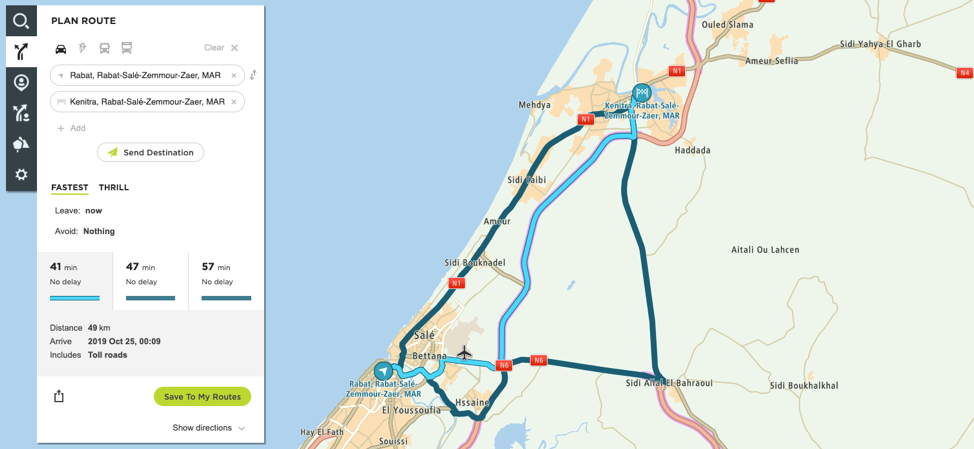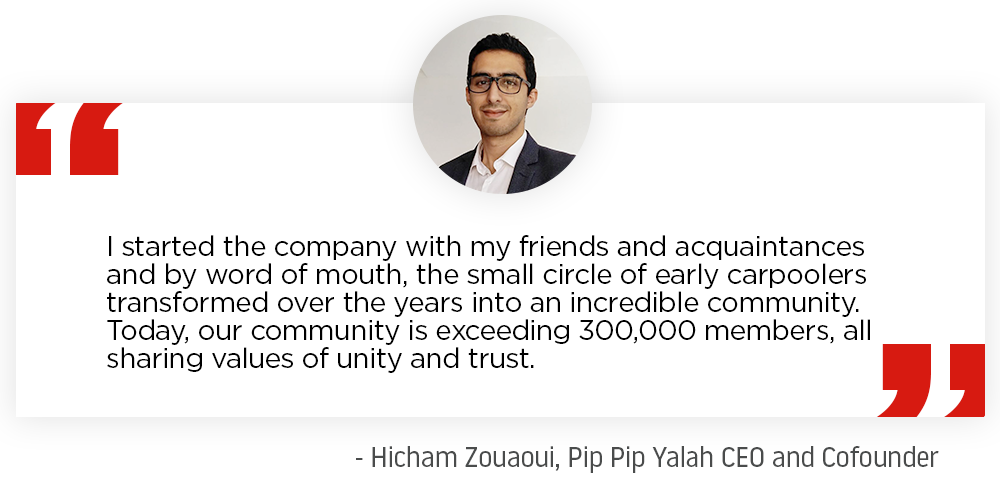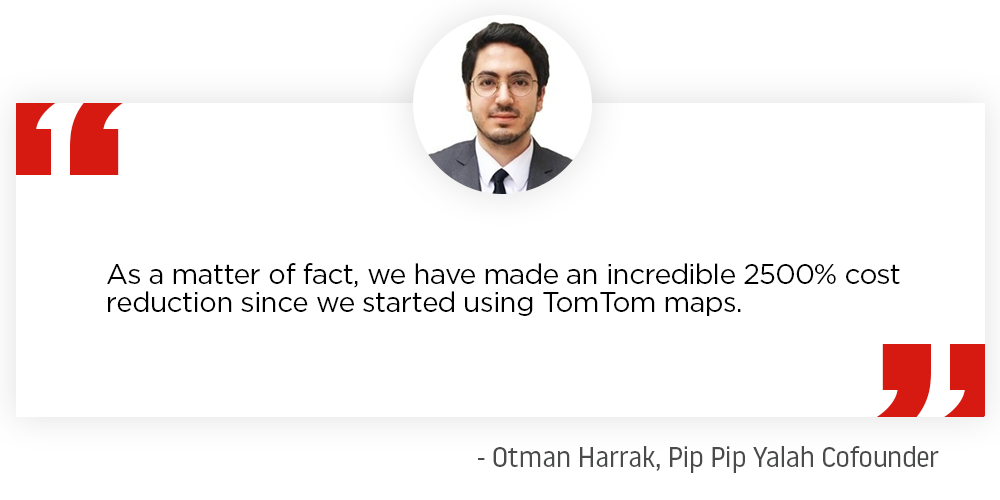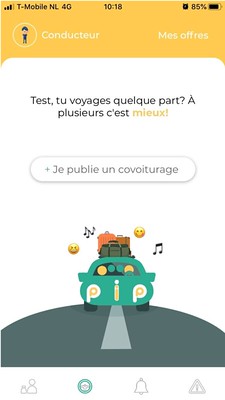Pip Pip Yalah Builds the First Ridesharing App for Morocco Serving Over 300,000 Users
)

Pip Pip Yalah is the largest ridesharing app in Morocco with over 300,000 users. Founded in 2013, the company started as a Facebook group that connected drivers and passengers. As the group grew, so did the need for an easier way to grab a ride which led the CEO and Founder, Hicham Zouaoui, to create a mobile app for users.
Meet Pip Pip Yalah
Pip Pip Yalah is the largest ridesharing app in Morocco with over 300,000 users. Founded in 2013, the company started as a Facebook group that connected drivers and passengers. As the group grew, so did the need for an easier way to grab a ride which led the CEO and Founder, Hicham Zouaoui, to create a mobile app for users.
When developing his app, Hicham needed location specialists to provide Map APIs to help connect users with their destinations and that’s where TomTom stepped in. With the support of our Maps APIs and Map Styler, the Pip Pip Yalah app was born.
We chatted with Hicham and Otman Harrak, co-founder, about what it was like starting this project, how it’s grown and the challenges and successes they faced along the way. Learn more about them and Pip Pip Yalah:
The Interview
Tell us more about Pip Pip Yalah and what it is.Pip Pip Yalah was founded in September 2013 and is considered today as the biggest ridesharing community in Morocco, counting +300,000 travelers sharing hundreds of long-distance trips around the country daily.
We initially connected drivers and passengers through a Facebook group, and as of April 2019 we underwent a big transition and now are operating under the format of an app, both on Playstore and Applestore.
We recently celebrated our first milestone, converting organically +40,000 members (13% of the group) into regular users of the recently introduced app.
We have to ask, what does Pip Pip Yalah mean?“Pip Pip” is the Moroccan onomatopoeia for a car horn. “Yalah”, which is more widely used in the world, means “let’s go”.
What about the origins story, how did it start?
During my daily commute from Rabat to Kenitra on train, I would see hundreds of motorists with empty seats, while people next to me were suffering from congestion, making it sometimes hard to breath and at risk to any possible malfunction or delay caused by the transportation company. I was progressively nurturing the conviction that it was high time to dare the concept of carpooling in Morocco.
I started the company with my friends and acquaintances, and by word of mouth, the small circle of early carpoolers transformed over the years into an incredible community. Today, our community is exceeding 300,000 members, all sharing values of unityand trust. These values were highlighted and publicized at many occasions, the best known yet being the derailment of a train at Bouknadel, right after which hundreds of members volunteered to drive and pick up the passengers who were spared by the tragic accident.
In October 2018, Otman Harrak who was fascinated by the group and its impact potential on travelers’ well-being and environment, joined the adventure as added co-founder to help scale the concept and deploy innovative solutions for a better, wider and more secure carpooling experience.
 As you started to scale and decided to create an app, what TomTom location services did you use?
As you started to scale and decided to create an app, what TomTom location services did you use?We’re currently deploying TomTom map’s services across the app, whether for destination search or at every practical step prior to publishing a carpooling offer (pick up location, cost per distance, etc.) TomTom map is omnipresent and is doing great! Our main SDK use is related to:
Search
Maps
Routing
There were 4 determining factors which oriented our transition benchmark:
[Geographical Comprehensiveness:]{.underline} Morocco’s public and private infrastructure is growing tremendously each year, so as a matter of fact, we needed a Map provider that could handle this evolution and allow our users to define precise and up-to-date pick-up locations.
[Cost:]{.underline} Our early invoices made us quickly aware of the necessity to control our map related costs. Reducing the number of in-app interactions wasn’t an option, we therefore looked closely into transaction costs and made it a key factor for our decision-making to better absorb the growing popularity of Pip Pip Yalah’s apps.
[Lightness and Loadability:]{.underline} We were looking for a network-friendly map that can load quickly even under low connection performance. A vectorized map was therefore seen as a valuable choice criterion.
[Geopolitical Sensitivity]{.underline}: This is sometimes ignored by many map providers but being neutral isn’t necessarily the best reaction against long-term geographical conflicts. We looked for a solution that understands our users’ sentiments and help us keep their trust and support.
Switching to TomTom was definitely a great deal for our users and our startup. We managed to execute a seamless transition that helped us keep the quality of the service that we provide without any concession that could impact our end-user’s appreciation.
TomTom Maps was the best candidate as it greatly matched with our four decision factors and even surpassed our expectations in terms of cost management. As a matter of fact, we have made an incredible 2500% cost reduction since we started using TomTom Maps.

Besides our APIs, you were also an early adopter of the TomTom Map Styler – how was your experience with it?
Our testing of the newly introduced Map Styler by TomTom was quite inspiring, to say the least. We have already envisioned a few interesting moves to make our map more unique. We’re thinking especially about adapting a few colors and rationalizing visible data to make our users’ experience more pleasant and practical.
What’s the next big thing for your Pip Pip Yalah? What’s the goal for the near and far future?We’re working hard to release the payment feature which will mark a new phase for our community and app in early 2020. In the next few years, we’re projecting to become one of the leading carpooling apps in Africa. The journey is only starting but we’re already heedful to build valuable partnerships and onboard the right investors to make the dream come true.
Learn More about Pip Pip Yalah

A big thank you to Otman and Hicham from Pip Pip Yalah for taking the time to chat with us about their app and how they used TomTom Maps APIs to build different. To learn more about their app, check out their website.